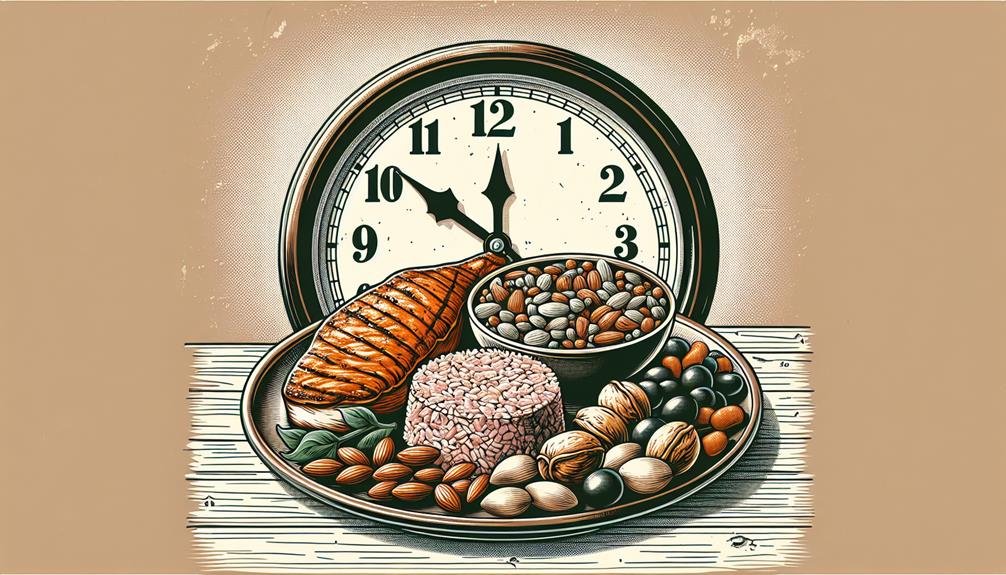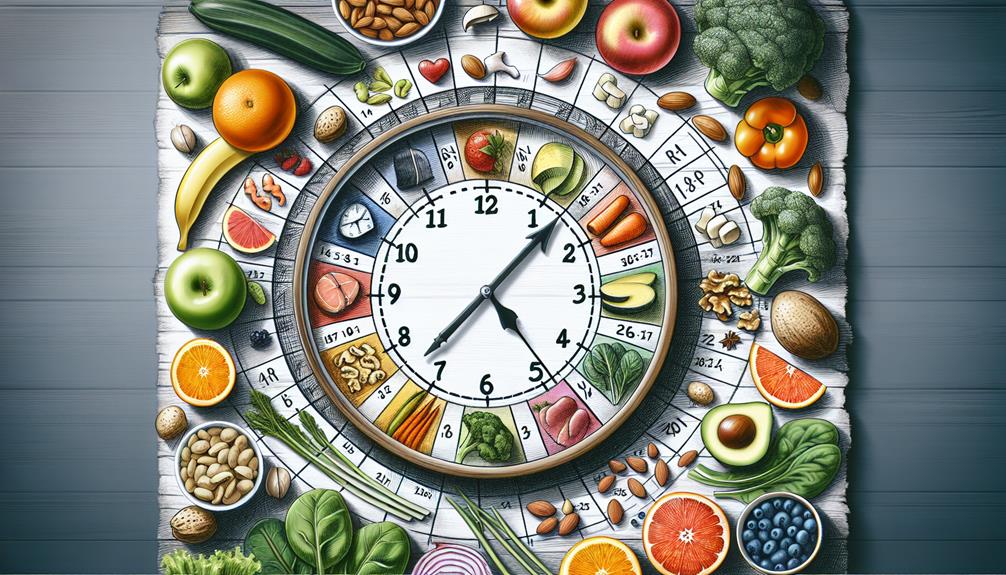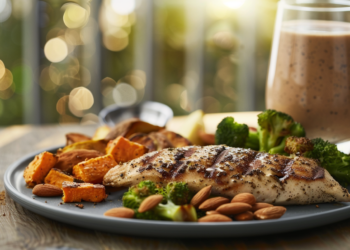Aligning meals with circadian rhythms, fasted cardio in the morning, and strategic pre/post-workout nutrition play vital roles in optimal fat loss. Consuming complex carbs and protein before workouts sustains energy and aids muscle repair. Post-exercise, refuel with protein shakes and carbs within 2 hours for muscle recovery. Early dinners with balanced macros aid digestion and prevent overeating. Consider how meal timing impacts your body's metabolic processes and hormone regulation for effective weight management.
Key Takeaways
- Align meal times with circadian rhythms for enhanced metabolism.
- Consider fasted cardio or morning workouts to boost fat loss.
- Consume a balanced pre-workout meal 1-3 hours before exercise.
- Optimize recovery with protein and carbohydrates post-workout within 2 hours.
- Eat dinner earlier, focusing on protein and balanced macronutrients for fat loss.
Circadian Rhythm and Meal Timing
When considering the optimal nutrition timing for fat loss, understanding the role of circadian rhythms in meal timing is crucial. Our body's internal clock, governed by circadian rhythms, influences hormone regulation and metabolism. Research suggests that aligning meal times with our circadian rhythms may enhance metabolic processes, aiding in weight management.
Meal frequency and nutrient timing play significant roles in regulating metabolism throughout the day. Hormones such as insulin, cortisol, and leptin fluctuate based on circadian patterns, impacting how our bodies process nutrients. For instance, consuming a balanced breakfast can kickstart metabolism in the morning when it tends to be most active. On the other hand, eating a large meal close to bedtime may disrupt circadian rhythms and hinder metabolic functions during sleep.
Fasted Cardio and Morning Workouts
Engaging in fasted cardio or morning workouts can be a strategic approach to optimize fat loss by tapping into the body's natural metabolic processes early in the day. Fasted cardio, which involves aerobic exercise on an empty stomach, has gained popularity due to its potential benefits in enhancing fat oxidation. Research suggests that exercising in a fasted state may increase the utilization of stored fat as fuel, potentially aiding in weight loss efforts. Additionally, fasted cardio can help improve insulin sensitivity and metabolic flexibility over time, contributing to better overall health.
Morning workouts, in general, have shown effectiveness in jumpstarting metabolism and energy levels for the day ahead. By engaging in physical activity in the morning, individuals may experience increased calorie burn throughout the day, creating a favorable environment for fat loss. Furthermore, morning exercise has been linked to improved mood, cognitive function, and adherence to a consistent workout routine. Whether opting for fasted cardio or morning workouts, finding a routine that aligns with personal preferences and goals is key to sustainable fat loss success.
Pre-Workout Nutrition Strategies

Implementing effective pre-workout nutrition strategies can significantly enhance performance and optimize results during exercise sessions. Ensuring adequate fuel before a workout is crucial for sustaining energy levels and maximizing performance enhancement. Here are some key strategies to consider:
- Carbohydrates: Consuming complex carbohydrates like whole grains or fruits 1-2 hours before exercising can provide a sustained release of energy.
- Protein: Including a moderate amount of protein in your pre-workout meal or snack can help support muscle repair and growth during exercise.
- Hydration: Hydrating adequately before a workout is essential for maintaining performance and preventing fatigue.
- Timing: Aim to eat your pre-workout meal 1-3 hours before exercising to allow for proper digestion and absorption of nutrients.
- Personalization: Experiment with different foods and timing to find what works best for your body and exercise routine.
Post-Workout Refueling and Recovery
After fueling your body with the necessary nutrients for optimal performance before a workout, it's equally important to focus on post-workout refueling and recovery to support muscle repair and replenish energy stores.
Following an intense workout, our muscles need replenishment to repair and grow stronger. One effective way to kickstart this recovery process is by consuming a protein shake. Protein shakes are convenient and provide the essential amino acids needed for muscle protein synthesis. Aim for a protein shake containing around 20-30 grams of high-quality protein within 30 minutes of finishing your workout.
In addition to protein intake, carbohydrates play a crucial role in post-workout recovery. Carbohydrates help replenish muscle glycogen stores, which are depleted during exercise. Consuming a mix of protein and carbohydrates post-workout can enhance muscle glycogen replenishment and promote a more robust recovery. Aim to consume a balanced meal or snack containing both protein and carbohydrates within 2 hours of your workout to optimize recovery and support your fitness goals.
Dinner Timing and Macronutrient Distribution

For optimal nutrition timing and fat loss, understanding the importance of dinner timing and macronutrient distribution is essential in supporting your fitness goals and overall health. When it comes to late dinners and macronutrient distribution, here are some key points to consider:
- Late dinners: Consuming dinner earlier in the evening rather than close to bedtime can aid in digestion and prevent disruptions to sleep patterns.
- Protein rich meals: Including a good source of protein in your dinner can help promote satiety and muscle repair and growth during the night.
- Balanced plate: Aim for a well-balanced meal with a mix of protein, healthy fats, and complex carbohydrates to provide sustained energy and nutrients.
- Portion control: Be mindful of portion sizes to avoid overeating, especially when consuming dinner late in the evening.
- Hydration: Remember to hydrate adequately throughout the day and even during dinner to support digestion and overall well-being.
Bedtime Snacks and Late-Night Eating
When considering bedtime snacks and late-night eating, it's important to be mindful of how these choices can impact our overall nutrition and weight management goals. Late-night cravings can be a challenge for many, but opting for healthy bedtime options can help satisfy hunger without derailing progress.
Choosing nutrient-dense snacks like a small handful of nuts, a piece of fruit, yogurt, or whole-grain crackers with hummus can be satisfying without being heavy on calories. It's best to avoid sugary treats or high-fat foods close to bedtime, as they can disrupt sleep and lead to weight gain.
Eating mindfully and listening to our body's hunger cues is essential when deciding whether to have a bedtime snack. If hunger strikes, opting for a light, balanced option can help prevent overeating the next day due to deprivation. Remember, it's about balance and moderation even when it comes to late-night snacking.
Intermittent Fasting Protocols

Opting for different intermittent fasting protocols can be a strategic approach to managing weight and improving metabolic health. When considering intermittent fasting, several protocols can be followed to achieve desired outcomes.
- 16/8 Method: This involves fasting for 16 hours a day and restricting eating to an 8-hour window, typically from noon to 8 pm.
- 5:2 Diet: With this approach, individuals eat normally for five days a week and reduce calorie intake to around 500-600 calories on the other two days.
- Eat-Stop-Eat: This method involves fasting for a full 24 hours once or twice a week.
- Alternate-Day Fasting: Participants alternate between days of normal eating and very restricted calorie intake every other day.
- Warrior Diet: This protocol involves consuming small amounts of raw fruits and vegetables during the day and having one large meal at night within a 4-hour eating window.
Frequently Asked Questions
How Does Stress Impact Nutrition Timing for Fat Loss?
Stress can disrupt our hormones, affecting appetite and fat storage. It can also mess with our sleep patterns, impacting metabolism. Understanding how stress influences these factors is crucial for optimizing nutrition timing for fat loss.
Can Genetics Play a Role in Determining the Best Nutrition Timing for Fat Loss?
Can genetics influence the ideal nutrition timing for fat loss? Genetic factors can impact metabolism and hormonal responses, affecting weight loss outcomes. Understanding individual genetic variations can help tailor nutrition timing strategies for optimal fat loss results.
Are There Any Specific Supplements That Should Be Taken at Certain Times for Optimal Fat Loss?
Supplement timing can impact their effectiveness. Meal timing is crucial for optimal results. Research supports specific supplements at certain times for fat loss. It's essential to align intake with activity levels for best outcomes.
How Does Hydration Throughout the Day Affect Fat Loss and Metabolism?
Staying well-hydrated throughout the day is crucial for optimal fat loss and metabolism. Proper hydration supports electrolyte balance, aids in digestion, and enhances performance. It's a simple yet powerful way to boost overall health.
Is It Necessary to Adjust Nutrition Timing for Fat Loss Based on Different Types of Exercise or Physical Activity?
We adjust nutrition timing for fat loss based on exercise duration and intensity. Meal frequency and composition play vital roles. It's essential to fuel before and refuel after workouts. Consistency matters more than timing precision for sustainable results.
Conclusion
In conclusion, the best nutrition timing for fat loss depends on individual preferences and lifestyle factors. Remember, consistency is key to seeing results.
Just like a well-timed orchestra performance, when you fuel your body at the right times, it can work in harmony to achieve your goals. So listen to your body, experiment with different timing strategies, and find what works best for you.
Stay committed and patient, and the results will follow.













